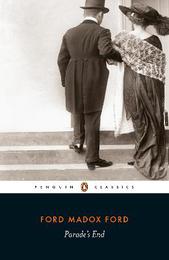
|
Parade's End
Paperback / softback
Main Details
| Title |
Parade's End
|
| Authors and Contributors |
By (author) Ford Madox Ford
|
|
Introduction by Julian Barnes
|
| Physical Properties |
| Format:Paperback / softback | | Pages:848 | | Dimensions(mm): Height 198,Width 129 |
|
| Category/Genre | Classic fiction (pre c 1945) |
|---|
| ISBN/Barcode |
9780241372548
|
| Classifications | Dewey:823.912 |
|---|
| Audience | |
|---|
|
Publishing Details |
| Publisher |
Penguin Books Ltd
|
| Imprint |
Penguin Classics
|
| Publication Date |
7 March 2019 |
| Publication Country |
United Kingdom
|
Description
Ford's great masterpiece set in the First World War, now in Penguin Black Classics with an introduction by Julian Barnes Consisting of four novels - Some Do Not..., No More Parades, A Man Could Stand Up and The Last Post - Parade's End is the story of Christopher Tietjens and his progress from the secure world of Edwardian England into the First World War and beyond. Both a portrait of a love triangle - between Tietjens, his beautiful and reckless wife Sylvia, and the suffragette Valentine - and a depiction of life on the Western Front, Parade's End is one of the greatest fictional works of the twentieth century. Ranging from the drawing rooms of England to the trenches of France, and moving between past and present, it is a haunting exploration of identity, loss and memory.
Author Biography
Ford Madox Ford was born Ford Hermann Hueffer in Kent in 1873. In 1915 he published The Good Soldier, and in the same year he enlisted in the army, serving as an infantry officer. Parade's End, the culmination of his experiences during the First World War, was published in four parts between 1924 and 1928. He moved to Paris in 1922 and founded the Transatlantic Review, whose contributors included James Joyce, Ezra Pound and Gertrude Stein. He died in Deauville, France in 1939.
ReviewsA neglected masterpiece of twentieth-century fiction - the English War and Peace -- John Gray Masterly...Ford knows more and sees deeper -- Julian Barnes There are not many English novels which deserve to be called great: Parade's End is one of them -- W. H. Auden [Ford] was the only Englishman who stood alongside the great 'moderns' - Joyce, Eliot and Pound -- Peter Ackroyd
|